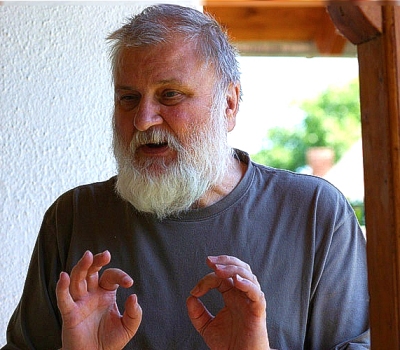PART V of Basho’s Haiku
Hungarian translations by Gabor Terebess
English translations by David Landis Barnhill
Note:
Gabor Terebess has translated 630 Basho’s haiku into Hungarian: http://terebess.hu/haiku/baso/terebess1.doc
To achieve this he has collected 10,000 English translations and identified each with the Japanese original (it took him two years).
From this extensive and valuable work Simply Haiku will select and feature 10 of Basho’s haiku in each issue.
びいと啼く尻声悲し夜の鹿
bii to naku / shirigoe kanashi / yoru no shika
az éjszakában
szarvasbőgéssel terjed
a szomorúság
crying „beeeee”…, / the lingering sound so sad: / night deer.
牡丹蘂深く分け出づる蜂の名残かな
botan shibe fukaku / wake izuru hachi no / nagori kana
peónia
porzói közül bús méh
kászálódik ki
from deep in the / peony’s pistils, the bee’s / reluctant parting.
屏風には山を画書いて冬籠り
byōbu ni wa / yama o egaite / fuyu-gomori
nyitott paraván
rajta festett hegyláncok
bezárták télre
on a folding screen / a mountain is painted: / winter seclusion
病雁の夜寒に落ちて旅寝かな
byōgan no / yosamu ni ochite / tabine kana
beteg vadliba
hideg éjbe zuhant le
elszenderülni
a sick goose / falling in the night’s cold: / sleep on a journey.
地に倒れ根に寄り花の別れかな
chi ni taore / ne ni yori hana no / wakare kana
lehull a virág
visszatér a földbe
gyökereihez
falling to the ground, / returning to the roots: / a flower’s farewell.
父母のしきりに恋し雉の声
chichi haha no / shikirini koishi / kiji no koe
fácán kiált föl
egyszerre visszahozza
holt apám-anyám
for my father and mother / I yearn so deeply- / a pheasant’s cry.
千鳥立ち更け行く初夜の日枝颪
chidori tachi / fuke yuku shoya no / hieoroshi
fölrebbent lilék
orkán dúl Hiei-hegyen
vészjósló az éj
plovers rising: / as early evening deepens, / winds storm down Mt. Hiei
粽結ふ片手にはさむ額髪
chimaki yū / katate ni hasamu / hitai gami
bambuszlevélbe
rizst teker míg fél kézzel
simítja haját
wrapping rice dumplings: / with one hand she puts back / her fallen hair
蝶も来て酢を吸ふ菊の膾哉
chō mo kite / su o sūkiku no / namasu kana
krizantémvirág
savanyú salátáját
lepke ízleli
a butterfly too comes / to sip the vinegar: / chrysanthemum salad.
蝶の羽のいくたび越ゆる塀の屋根
chō no ha no / ikutabi koyuru / hei no yane
csapongó lepkék
hányszor szárnyalják túl
a fal tetejét
butterfly wings: / how many times fluttering / over the wall’s roof.

 David Barnhill is Director of Environmental Studies and Professor of English at the University of Wisconsin Oshkosh. His translation of Bashō’s haiku, Bashō’s Haiku: Selected Poetry of Matsuo Basho (SUNY, 2004) includes over 700 haiku with a brief commentary on each. His book Bashō’s Journey: Selected Literary Prose by Matsuo Bashō (SUNY, 2005) is the most complete English translation of Basho’s prose, including all five travel journals, his one diary, and many of his haibun. David has also published several articles on Bashō’s spirituality and he teaches a course called “Japanese Nature Writing.”
David Barnhill is Director of Environmental Studies and Professor of English at the University of Wisconsin Oshkosh. His translation of Bashō’s haiku, Bashō’s Haiku: Selected Poetry of Matsuo Basho (SUNY, 2004) includes over 700 haiku with a brief commentary on each. His book Bashō’s Journey: Selected Literary Prose by Matsuo Bashō (SUNY, 2005) is the most complete English translation of Basho’s prose, including all five travel journals, his one diary, and many of his haibun. David has also published several articles on Bashō’s spirituality and he teaches a course called “Japanese Nature Writing.”

 Gábor Terebess was born in Szeged, Hungary, and lived as a political refugee in the sixties (living in France, USA, and Australia). He was ordained as a Zen Buddhist monk in Japan. After the change of regime in Hungary, he published his book on Zen, Folyik a híd(The bridge flows, 1990),and later started an Oriental publishing house. He also edits a Hungarian language haiku database (http://haiku.hu), and an international haiku database: (http://terebess.hu/english/haiku/haiku.html). He's translated 3,000 haiku into Hungarian, and published 6 haiku books. English translations of his haiku by the Canadian-Hungarian poet, Jon Tarnoc can be read via:http://terebess.hu/english/haiku/terebess.html.
Gábor Terebess was born in Szeged, Hungary, and lived as a political refugee in the sixties (living in France, USA, and Australia). He was ordained as a Zen Buddhist monk in Japan. After the change of regime in Hungary, he published his book on Zen, Folyik a híd(The bridge flows, 1990),and later started an Oriental publishing house. He also edits a Hungarian language haiku database (http://haiku.hu), and an international haiku database: (http://terebess.hu/english/haiku/haiku.html). He's translated 3,000 haiku into Hungarian, and published 6 haiku books. English translations of his haiku by the Canadian-Hungarian poet, Jon Tarnoc can be read via:http://terebess.hu/english/haiku/terebess.html.


